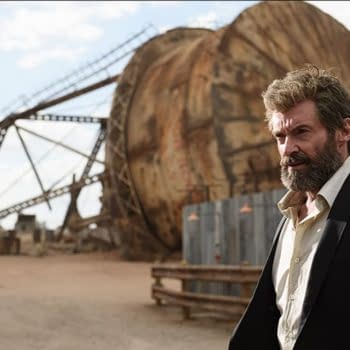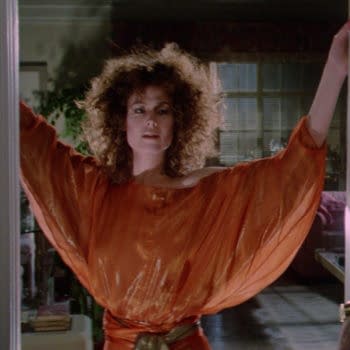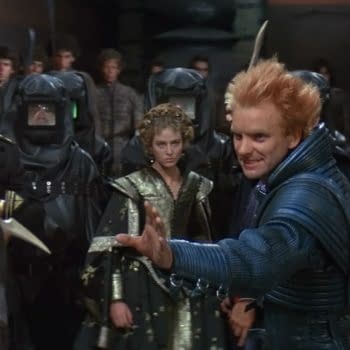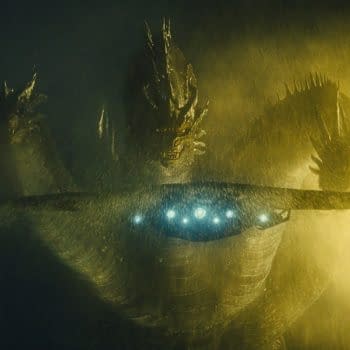Posted in: Bill Watters, Movies, Review | Tagged: film, first man, movie, nasa, Review, space
First Man: The Naked Singularity Within A National Mythos [Review]
Now, don't panic when I say "national mythos" in the headline of this review. I'm in no way suggesting the moon landing was a myth. Apollo 11 and the wider Apollo project at large is a part of the American psyche and it's own historic construct – the individuals involved were all larger than life, doing what only a few years before would be the impossible. At the center of that story is the Neil Armstrong, the first man to set foot on the surface of the moon. So that's where First Man centers itself: firmly in the center of that point in history.
Such stories are often captured with all their wide reach and all of the people in the picture, such as in the classic 1983 film The Right Stuff which encompasses the Mercury program which dawned the American space program. However this time it the arc of this film narrows everything down to nearly just two people – Neil (played by Ryan Gosling) and his wife Janet (played by Claire Foy). It's a story about a married couple coming to grips with personal tragedy with the loss of their daughter Karen from cancer at the age of two. They're imperfect as people, and as a couple, and on top of the pressures of trying to make it work, he moves from being a test pilot to first an astronaut on the Gemini program and then on to Apollo.
The film is beautifully crafted, and the film will without a doubt be on every last nominee list for sound design throughout the award season. Rather than pour a heavy score into every scene, there's full scenes of nothing but absolute silence, and others where it's the sounds of the capsule's metal and bolts screaming in protest as it cuts through the atmosphere. This is another one of those films that a large screen is nice, but if you have the ability to get to a Dolby Cinema with their full bells and whistles sound system, do it.
There are other characters that flit in and out of the story, like the other astronauts, Edward Higgins White (played by Jason Clarke), Gus Grissom (by Shea Whigham), and Buzz Aldrin (played by Corey Stoll). They join Neil on the stage for a scene, then depart. When they are near him, we're reminded of the scope of the impact of what's going on – the clash of the space race between the Soviet Union and the United States, the desire to be the ones to get there first, the high probability of being the first ones to die in space.
When we finally do get to the moon, it's breathtaking, and you feel for a moment, Neil is taking in his achievement, and reflecting. But then it's back to business as always. He's not a heroic figure for the most part, and full of very real foibles. At times it feels like he doesn't even care that much about what's going on around him; in one scene where he's told he'll be on the Apollo 11 crew and the first man to step onto the lunar surface, he simply nods and says, "ok." It's not bravado, it's just the fact that he's accepting of what will be the next step in his life.
By the end of the film, after everything that's just happened, and all the world breathes it's collective breath as the astronauts have returned to Earth, it's still just a quiet scene, between two people – who don't really have many words, but in some relationships they really aren't needed.
It's a different kind of movie than The Right Stuff, though there will be inevitable comparisons. That one was about the program and everything it took to come together to get the Mercury program formed and going. This time rather than the elements of the star which we always see, that popular image of the Apollo astronauts and their achievements glowing and brilliant, it's that singularity at the core of that story. Two people, circling each other, and in this film, this time, it very much works.


![First Man: The Naked Singularity Within A National Mythos [Review]](https://mlpnk72yciwc.i.optimole.com/cqhiHLc.IIZS~2ef73/w:600/h:400/q:75/https://bleedingcool.com/wp-content/uploads/2018/10/firstman1.jpg)





!['Rocketman' Soars With Warts and All Elton John Story [Review]](https://mlpnk72yciwc.i.optimole.com/cqhiHLc.IIZS~2ef73/w:350/h:350/q:75/rt:fill/g:ce/https://bleedingcool.com/wp-content/uploads/2019/01/rocketman.3-350x350.jpg)







